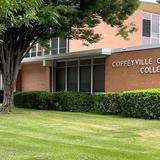- The mission of Neosho County Community College is to enrich our communities and our students' lives.
School Highlights
Neosho County Community College serves 2,057 students (29% of students are full-time).
The college's student:teacher ratio of 10:1 is lower than the state community college average of 16:1.
Minority enrollment is 27% of the student body (majority Hispanic), which is less than the state average of 40%.
Quick Stats (2025)
- Enrollment: 2,057 students
- In-state tuition: $4,148
- Out-state tuition: $4,148
- Student:teacher ratio: 10:1
- Minority enrollment: 27%
- Source: Integrated Postsecondary Education Data System (IPEDS)
School Overview
The teacher population of 214 teachers has stayed relatively flat over five years.
Neosho County Community College
(KS) Community College Avg.
Carnegie Classification
Associate's Colleges: High Career & Technical-Mixed Traditional/Nontraditional
Associate's Colleges: Mixed Transfer/Career & Technical-High Nontraditional
Institution Level
At least 2 but less than 4 years
At least 2 but less than 4 years
Institution Control
Public
Public
Total Faculty
214 staff
155 staff
Student Body
The student population of Neosho County Community College has grown by 8% over five years.
The student:teacher ratio of 10:1 has increased from 8:1 over five years.
The Neosho County Community College diversity score of 0.46 is less than the state average of 0.60. The school's diversity has grown by 16% over five years.
Total Enrollment
2,057 students
2,057 students
Student : Teacher Ratio
10:1
16:1
# Full-Time Students
606 students
606 students
# Part-Time Students
1,451 students
1,451 students
# Enrollment Undergraduate
205 students
229 students
# Full-Time Undergraduate Students
606 students
569 students
# Full-Time Graduate Students
n/a
11 students
# Part-Time Undergraduate Students
1,451 students
1,424 students
# Part-Time Graduate Students
n/a
5 students
Total Dormitory Capacity
293 students
342 students
% American Indian/Alaskan
1%
1%
% Asian
1%
3%
% Hispanic
7%
15%
% Black
4%
8%
% White
73%
60%
% Hawaiian
4%
1%
% Two or more races
4%
4%
% Non Resident races
4%
2%
% Unknown races
2%
6%
Diversity Score
0.46
0.60
College Completion Rate (Students who graduate in less than 4 years)
40%
41%
College Completion Rate (Students who graduate in 4 years or more than 4 years)
n/a
31%
Average Graduate Earnings (10 Years)
$34,000
$34,000
Tuition and Acceptance Rate
The public in-state tuition of $4,148 is more than the state average of $3,402. The in-state tuition has declined by 17% over four years.
The public out-state tuition of $4,148 is less than the state average of $4,296. The out-state tuition has declined by 17% over four years.
In-State Tuition Fees
$4,148
$3,402
Out-State Tuition Fees
$4,148
$4,296
% Students Receiving Some Financial Aid
96%
90%
Median Debt for Graduates
$8,583
$8,892
Median Debt for Dropouts
$4,750
$5,467
Acceptance Rate
n/a
100%
ACT Composite
n/a
21
Source: 2024 (or latest year available) Integrated Postsecondary Education Data System (IPEDS) , School Administrators
School Notes
- School Mascot: Panthers
- • Neosho County Community College (NCCC) traces its beginnings to Chanute Junior College, established in 1936 so that graduates of Chanute High School as well as other area high schools could attend college close to home. Chanute Junior College operated as a part of the public school system and was governed by the Chanute Board of Education until July 1, 1965. • In 1961, State legislation provided the means for the college to become a countywide community junior college, and on July 1, 1965, Chanute Junior College became Neosho County Community Junior College, an institution with its own governing Board of Trustees. Voters in Neosho County passed a bond issue in October 1965, providing for a four-building campus, separate from the high school, to be constructed in the southwestern part of Chanute. The new facilities—two instructional buildings, with one containing an administrative center; a library; and a student center—were ready for use at the start of the 1968 fall semester. Added to the campus was an interdenominational chapel, a gift from the estate of the late Jewel and K.C. Snyder. • Our instructors are all degreed professionals with years of experience in their fields and years of experience in education. The faculty are constantly updating their knowledge and ensuring that the curriculum is in line with transfer institutions, so you will be fully prepared for junior and senior level classes no matter where you transfer to complete your bachelor's degree. • NCCC operates on a two semester school year - spring and fall - with a summer term. However, many short-term, on-line and weekend classes are offered within each semester. Our Ottawa campus offers extensive block scheduling and weekend classes to meet the needs of adult students. • The new slogan the College is: The education you need. The attention you deserve. One way we are insuring we are providing the education you need with the attention you deserve, is through the development of on-line courses that will allow you to learn in your home at the times convenient for your life. This semester, six faculty members are working with the College's new JICS software package to design learning packages that can be delivered over the internet. These courses will be in our fall schedule and serve as the foundation courses for a full degree program to be delivered in this modality. • Sports Associations Memberships: National Athletic Association, National Junior College Athletic Association
Frequently Asked Questions
How much does Neosho County Community College cost?
Neosho County Community College's tuition is approximately $4,148 for In-State students and $4,148 for Out-State students.
Recent Articles

Debating Your Way to Career Success: The Hidden Benefits of Joining a Community College Debate Club
This article highlights three key reasons why joining a debate club in community college can significantly boost career prospects. It explores how debate activities enhance public speaking skills, critical thinking abilities, and networking opportunities, all of which are valuable assets in the job market.

Community Colleges Nationwide Joining in President Obamas Interfaith and Community Service Campus Challenge
Learn about the number of colleges joining the President’s Interfaith and Community Service Campus Challenge, which was introduced by the White House this past spring.

Careers: Customs Broker/Freight Forwarder/Logistics
Explore the dynamic world of customs brokerage and freight forwarding, where precision meets strategy in global logistics. This article delves into the critical role of customs brokers and freight forwarders, who navigate complex regulations and ensure the smooth transit of goods across international borders. Discover the skills and expertise required to excel in this field, from understanding tariff codes to managing documentation and customs clearance. Learn about the impact of these professionals on supply chain efficiency and the opportunities available in this growing industry.











